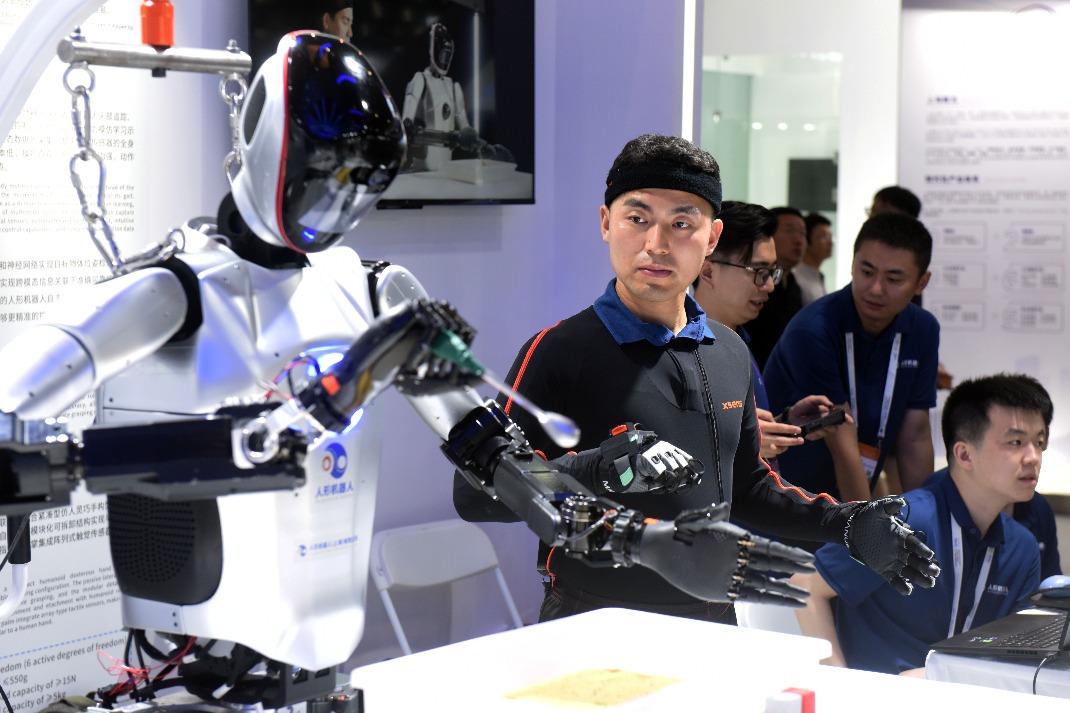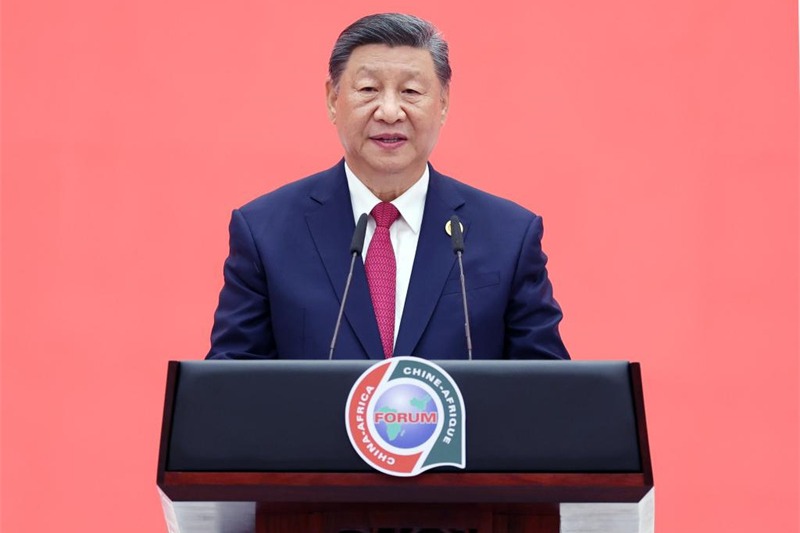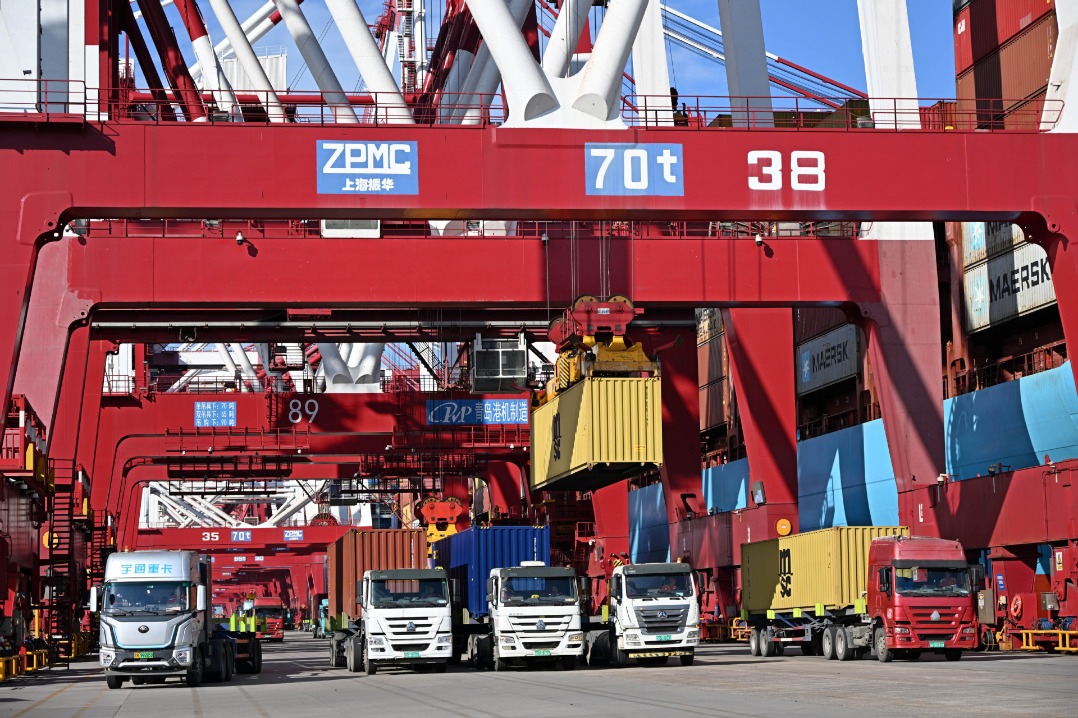GT Racing has world's gamers' backs


Chinese game chair maker rolls out targeted efforts to comfort more consumers overseas
Work from home, amiably abbreviated as WFH by people working at multinational corporations where such ideas first took off, has evolved from scarcity to a "new normal" as the COVID-19 pandemic reshaped people's lives in many ways.
People made their WFH environment by adding a bit of professionalism and comfort. Gaming chairs, which you can tell from scores of video conferences, have entered many homes after the COVID-19 outbreak.
As noticed by Peng Xiaofei, president of gaming chairs maker GT Racing, orders started to pour in from April 2020, when COVID-19 started to hit many overseas markets.
People began working from home to avoid any close contact and possible infection. They posed higher requirements on the home office environment. Gaming chairs, which feature ergonomic designs for long hours of gaming experiences, became the ideal substitute for armchairs or any other chairs one can find at home, Peng said.
As a result, GT Racing's income from its independently managed direct-to-consumer e-commerce platform contributed 20 percent to the company's income in less than six months, up from 5 percent prior to the outbreak.
"The spiking orders greatly exceeded our expectations. We felt we had to work 24/7 to meet consumers' needs. The orders continue to spike more than twice in the second half of 2020. But the good thing is, we had enough storage in overseas warehouses before the pandemic," she said.
To cater to rising demand, GT Racing set up two overseas warehouses and an independent warehouse management team in the United States early in 2021.
With a self-managed 20,000-square-meter factory located in Liu'an of East China's Anhui province, GT Racing is able to churn out 20,000 gaming chairs in this facility annually. But this capacity only satisfied 20 percent of the company's orders last year.
The remaining 80 percent were outsourced to other factories. GT Racing will expand the factory to 70,000 sq m this year because of rising overseas demand. The move will quadruple the company's annual capacity, Peng said.
It took about 10 years for GT Racing to get to this level. Founded in 2011, GT Racing took off as a business-to-business original equipment manufacturer (OEM) selling sofas in the US, Europe and Japan.
The long-term cooperation with overseas e-commerce platforms made Peng think it was probably the right time to transform from being a B2B to a B2C (business-to-customer) outfit. They built their own e-commerce business in 2016.What they needed was the right project.
Peng noticed that the demand for gaming chairs started to emerge in 2016. Different from office chairs and sofas, there was no established gaming chair brand by then. In other words, GT Racing could print its logo on the gaming chair and build brand awareness.
There is a bit of luck in rapid brand recognition. Before Peng's startup of gaming chairs, there was already a computer racing game bearing the same name of "GT Racing".
"Although the game no longer exists, the duplication helped the gaming chair business win over some customers at the very beginning," she said.
Of course, the company will not stand still by relying on luck alone.
Precise pricing is one secret for GT Racing's success. The average price of their gaming chairs comes at around $150 each, which is the medium-level price category in the market. For cheaper versions, prices may be tantalizing but quality is not prioritized. Less quality will not be translated into repeat purchases.
For premium gaming chairs priced at $300 each, consumers may be hesitant, said Peng.
Brand recognition, which has been stressed since their transformation in 2016, is a key to their expansion in overseas markets. The company started to team up with Google in early 2019 to set up its own DTC (direct-to-consumer) e-commerce platform. By working with YouTube influencers and key opinion leaders, the brand's recognition rose rapidly among gaming chair consumers. Increasing search data provided solid proof of that, Peng said.
"A prestigious brand name is really important. There are hundreds of thousands of sofas available in the market. Consumers can hardly remember the specific design no matter how unique it is but a good brand name can work as a real kick. A well-established brand can stay in the market for a really long time. Without that, a company may become profitable rapidly, but that process will be very brief," she said.
"If the consumer experience is good enough, repeated purchases will be a sure thing to happen. The word-of-mouth effect will bring in new customers," she added.
In 2021, the US contributed 40 percent of GT Racing's income, while Europe and Japan respectively accounted for 30 percent of the company's revenue. A younger generation aged between 18 and 35 made up the majority of users in Europe and the US, while the upper limit is extended to 45 in Japan.
Although DTC is a major rising trend in e-commerce these days, Peng admitted it is difficult to attain and retain consumers on their own at the very beginning compared to the huge traffic that large e-commerce platforms own. It is crucial for outbound companies to seek localized suggestions from third-party organizations.
The discovery that GT Racing gained is that they easily lost consumers when it came to the last step of each purchase, which is payment. With insights from third-party consultants, they came to understand that US consumers prefer installments for new models and pricey products. Based on this, they made minor changes to their website and this helped boost income significantly.
Data from London-based consulting firm Technavio showed the global gaming chair market is poised to grow by $130.77 million from 2021 to 2025, progressing at a compound average growth rate of 5.49 percent during the period.
For GT Racing, one market they would like to explore this year is South Korea, whose potential they have overlooked for many years, said Peng. The company is planning to tap into related sectors such as gaming tables and headsets.
Capital-wise, GT Racing is expected to complete its series B financing in spring this year. It has already prepared for a float at the technology-focused ChiNext at the Shenzhen bourse.
Tang Guoyang, investment director of GF Xinde Investment, said over 70 percent of the world's furniture is produced in China, featuring high quality and good prices thanks to the country's advantageous supply chain.
GT Racing's years of experience in overseas markets and their nimble marketing strategies helped it to build its brand awareness, which allows overseas consumers the opportunity to understand what the made-in-China quality means, Tang said.




































